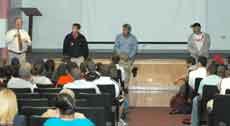Members of Nicholls’ fraternities and sororities met Oct. 24 to discuss the possibility of Greek students living in on-campus Greek housing by fall 2008. Greek adviser Tom Stephens said housing is needed to “bring the Greek students back to the campus.” He said many students live in local apartments, and by creating a community on campus, the organizations will be better able to work together. He said campus involvement is low in the afternoons and on weekends, and housing will help change that.
Stephens said the fraternity houses will be between the soccer field and married student housing on Audubon Drive. The site for sorority housing will be between married student housing and Babington Hall. He said though the schedule is very tentative, construction could start by January 2008 with some houses being inhabitable by August 2008.
Individual chapters will decide whether or not to build and reside in the housing, Stephens said. The funding for housing will also come from the individual chapters, he said. They will get the funds from alumni, national offices or through fundraisers. Stephens said the residents will also be responsible for paying rent.
The chapters must decide to build houses with bedrooms for all or most of the members as well as meeting rooms or lodges, which only have meeting rooms and two or three bedrooms for officers such as president, treasurer, etc.
Certain conditions will have to be met before chapters can build. These stipulations are similar to the regulations subdivisions enforce to ensure unity and make all houses appear similar, such as minimum and maximum size restrictions and mandatory building materials. These requirements will be provided to chapters in a Declaration of Conditions.
Stephens said all three of the National Panhellenic Council sororities, all five Interfraternity Council fraternities and three or four National Pan-Hellenic Council chapters have expressed interest in building housing for their organizations. The interested chapters have until Sept. 2007 to make a proposal to the University, Stephens said.
Eugene Dial, vice president of Student Affairs and Enrollment Services, said to be able to afford a house and get a loan, chapters will probably need to have had 35-40 members for two or three years to show stability within the organization. He said smaller chapters will likely have to get funding from alumni and other means.
“The alumni lease the land from the University, build a house or lodge and then turn the lease over to the chapters,” Dial said.
The chapter will have a mortgage, utility bills, furniture to buy and maintenance for the building and grounds, he said.
Stephens said it should be financially feasible for the chapters to live in the housing.
“It has worked across the country at other universities,” he said. “It tends to be about the same as a residence hall; sometimes it’s less expensive, but the residents will carry most of the burden.”
Katie Giroir, government senior from Thibodaux and member of Sigma Sigma Sigma, said she is unsure if benefits of housing justify the high cost.
“I think it is a great idea, but getting the money is going to be difficult,” she said.
Dial said if at some point before the Greek housing becomes a reality the University needs the land to build new residence halls, Nicholls will set aside another property of similar size. He said the building of Greek housing will not interfere with the building of residence halls.








